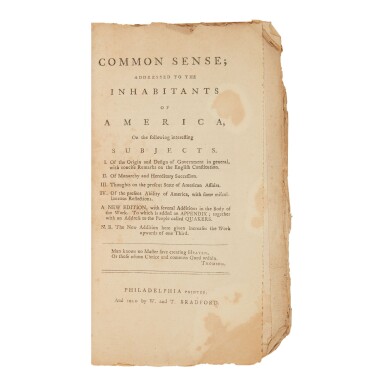PAINE, Thomas (1737-1809). Common Sense; Addressed to the Inhabitants of America . - Large Additions ... An Appendix to Common Sense ... Together with an Address to the People called Quakers . - And, A Dialogue between the Ghost of General Montgomery, just arrived from the Elysian Fields; and an American Delegate in a Wood, near Philadelphia: On the Grand Subject of American Independency . Philadelphia: R. Bell, 1776. 8 o (197 x 124 mm). Half-title, general title, and separate titles for the three sections. (700 mm. tear to D1, with loss of a couple of words, some light spotting). Disbound (the final part, A Dialogue between the Ghost ... and an American Delegate separately bound in later marbled wrappers). Third edition of Common Sense ; FIRST EDITION of A Dialogue . The most complete text of Common Sense , the typesetting in mixed state but the majority in Gimbel's second setting. "Paine's Common Sense , published anonymously in January, 1776, was the first vigorous attack on King George, a 'hardened, sullen-tempered Pharoah,' Paine called him, and the first public appeal for an American Republic. It is not too much to say that the Declaration of Independence of July 4, 1776, was due more to Paine's Common Sense than to any other single piece of writing." (Grolier/ American 14). Paine refused to copyright the work, so that it could spread rapidly through the country. At least 16 editions were printed in Philadelphia alone that year, as well as many in other cities, including London. "Most English editions deleted the many aspersions on King and Government" (Howes). "The decision to declare independence was not an easy one. Americans were tied by kinship, culture and commerce to England ... During the winter of 1775-1776, many Americans remained confused by recent events and uncertain about what action the colonies ought to take ... In a crisp, vigorous style, Paine told Americans what they had been waiting to hear. In a few short pages he summarized the case against the institution of monarchy and presented an argument for American independence that was elegantly yet so simply stated that it could be understood by nearly every American" ( A Covenanted People , 27). A Dialogue , believed not to have been written by Paine, appears here for the first time, with a separate title. Gimbel CS-9 . (2)
PAINE, Thomas (1737-1809). Common Sense; Addressed to the Inhabitants of America . - Large Additions ... An Appendix to Common Sense ... Together with an Address to the People called Quakers . - And, A Dialogue between the Ghost of General Montgomery, just arrived from the Elysian Fields; and an American Delegate in a Wood, near Philadelphia: On the Grand Subject of American Independency . Philadelphia: R. Bell, 1776. 8 o (197 x 124 mm). Half-title, general title, and separate titles for the three sections. (700 mm. tear to D1, with loss of a couple of words, some light spotting). Disbound (the final part, A Dialogue between the Ghost ... and an American Delegate separately bound in later marbled wrappers). Third edition of Common Sense ; FIRST EDITION of A Dialogue . The most complete text of Common Sense , the typesetting in mixed state but the majority in Gimbel's second setting. "Paine's Common Sense , published anonymously in January, 1776, was the first vigorous attack on King George, a 'hardened, sullen-tempered Pharoah,' Paine called him, and the first public appeal for an American Republic. It is not too much to say that the Declaration of Independence of July 4, 1776, was due more to Paine's Common Sense than to any other single piece of writing." (Grolier/ American 14). Paine refused to copyright the work, so that it could spread rapidly through the country. At least 16 editions were printed in Philadelphia alone that year, as well as many in other cities, including London. "Most English editions deleted the many aspersions on King and Government" (Howes). "The decision to declare independence was not an easy one. Americans were tied by kinship, culture and commerce to England ... During the winter of 1775-1776, many Americans remained confused by recent events and uncertain about what action the colonies ought to take ... In a crisp, vigorous style, Paine told Americans what they had been waiting to hear. In a few short pages he summarized the case against the institution of monarchy and presented an argument for American independence that was elegantly yet so simply stated that it could be understood by nearly every American" ( A Covenanted People , 27). A Dialogue , believed not to have been written by Paine, appears here for the first time, with a separate title. Gimbel CS-9 . (2)












Testen Sie LotSearch und seine Premium-Features 7 Tage - ohne Kosten!
Lassen Sie sich automatisch über neue Objekte in kommenden Auktionen benachrichtigen.
Suchauftrag anlegen